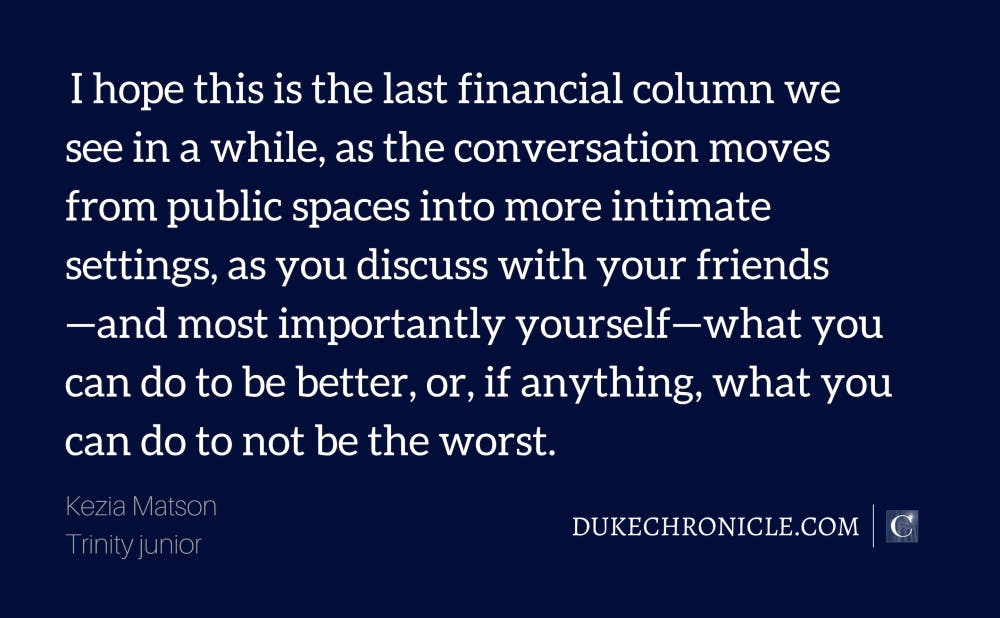I am tired of reading about being low-income at Duke. Weekly, I am confronted with the anomaly of my low-income status on Duke’s campus in the form of emails and truly well-intentioned events. “Brunch for 1st Gen, Low SES students!” “Conversation on Financial Management at Duke!” Daily, I am confronted with my low-income status in a more personal way, as I look at the brands of jackets, bags, and surprisingly even day planners around me. Yes, feeling uncomfortable, out-of-place, and insecure transcends carrying the heavy weight of financial insecurity on your back. It can be superficial. It’s just as often, and valid, that I feel these insecurities when deciding whether to buy Juul pods as I do walking into my third job.
Just because the burden of being poor at Duke manifests itself in different forms does not make the discomfort any less rational—feelings of social acceptance and community factor into our sense of security.
However, I will not validate the “feeling” of being low-income that has settled upon some non-low-income students. Middle class and high socioeconomic status (SES) students might find themselves feeling class anxieties previously unknown to them on a campus with a disproportionate number of 1 percenters, but that does not give them the authority to speak for me, or other actual low SES students at Duke. Moreover, I do not have the authority to speak for fellow low-income students, as each situation is unique in its difficulties. So instead, I will pivot this column to address high-income students. Since it seems that everyone and their aunt has advice for how low-income students should spend their time and money, it is only fitting the real minority (at least in terms of quantity of tone-deaf Chronicle columns) receives some attention.
How to be High Income at Duke and Not The Worst Person
- Elevate your friends’ voices—quietly. As your friends of low SES speak of their difficulties—this is given, hopefully, that you have friends in a different SES that feel comfortable enough to share this with you—take it in. Do not try to relate if the relation isn’t there. Hearing that you, too, once had a job over the summer in 2016 will not make your friend struggling to balance two jobs feel heard.
- “Let’s just walk!” “Let’s just C1!” If you’re not willing to call an Uber without splitting it, bundle up and just walk to the party or coffeeshop. It is not likely, in the middle of winter, that your friend wants to take a cold and out-of-the-way path just for funsies. Call the Uber yourself or don’t complain.
- Dinner parties and drinks. Too often, the thing standing between me and a friend’s birthday celebration is the price of the restaurant. Even more casually, the possibility of grabbing food off campus or going out for drinks leads to a conversation that no one would like to have. Suggesting an expensive place forces me to either quietly decline—making you think I don’t want to spend time with you or that I’m flaky—or to honestly say “I can’t afford that,” causing a weird guilt to fall over the two of us. It’s better in large group settings, or with friends you know are financially struggling, to just avoid that conversation in all. Please, do it up big when your parents visit, but for now, let’s stick to dining in.
- Don’t be a mentor. I’m glad you read “Nickel and Dimed” four years ago but please refrain from well-intentioned advice. Don’t hang over my shoulder as I online shop and say “I thought you were stressed about money this week.” I’m allowed to make my own bad financial decisions! I already have my mom and my conscience on my back. Do I have the same liberty to make bad decisions as more financially privileged people? No, but at least extend me the agency.
- Lastly, start hearing yourself. I have sat through a full conversation comparing winter ski resorts. “I liked our first house better, but my father really prefers Jackson Hole.” I have heard someone respond to another person’s financial woes with the words “Wow, bummer.” Maybe you’ve taken a class on ethics, or read about the impact of demographic differences and economic instability in this area, but if it is not making its way into your life casually you’ll continue to negatively impact your peers overtly.
I am the product of several situations beyond my control. I’ve always lived below the poverty line, and in the years preceding Duke those issues were exacerbated by the maladies of cancer, death in the family, and more recently the loss of our family business and sole source of income from Hurricane Florence. But beyond this, I am very privileged. I am a white, cisgender woman attending one of the top universities in the country. I have the privilege to hide, or at least disguise, this part of my identity in times that I feel threatened or unwelcome. This is not the case for other ostracized identities on campus, so I’d urge those from a place of privilege to work on changing your environment around you. The pressure to conform should not fall upon the shoulders of persons already bearing the weight of oppression, but rather should be renegotiated by persons with the mobility to do so. I hope this is the last financial column we see in a while, as the conversation moves from public spaces into more intimate settings, as you discuss with your friends—and most importantly yourself—what you can do to be better, or, if anything, what you can do to not be the worst.
Kezia Matson is a Trinity junior.
Get The Chronicle straight to your inbox
Sign up for our weekly newsletter. Cancel at any time.

